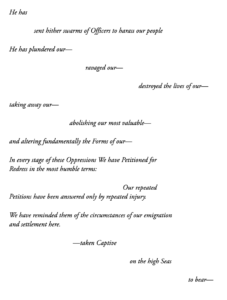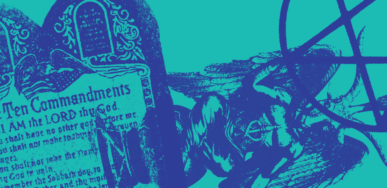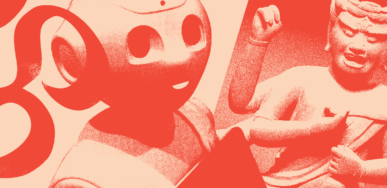
Sacred & Profane Season 3, Episode 4
[00:00:00] Martien Halvorson Taylor I'm Martien Halvorson Taylor.
[00:00:02] Kurtis Schaeffer And I'm Kurtis Schaeffer.
[00:00:04] Martien Halvorson Taylor And this is Sacred & Profane, a show where we explore how religions shape us and how we shape religions. We are approaching the Fourth of July, a time for fireworks, barbecues and parades, all celebrating that pivotal moment in the United States origin story, July 4th, 1776. The date on which representatives from each of the 13 original colonies signed off on a formal Declaration of Independence
[00:00:45] JFK When in the course of human events, it becomes necessary for one people to dissolve the political bands which have connected them with another...
[00:00:54] Martien Halvorson Taylor Celebrating the Fourth of July is part of what some scholars identify as America's civil, religious and like any religion, that civil religion is built in part upon foundational myths and symbols that Americans, regardless of their religious faith, believe in and rally behind.
[00:01:17] Kurtis Schaeffer Sometimes that's a physical place or an artifact like the Capitol Building or the Liberty Bell or Mt. Rushmore.
[00:01:26] Martien Halvorson Taylor But like many religions, there are also sacred texts, snippets of which a lot of Americans know by heart and that are a touchstone for what it means to be an American. Take Emma Lazarus' poem on the Statue of Liberty.
[00:01:46] Lazerus Give me your tired, your poor, your huddled masses
[00:01:51] Lazerus yearning to be free. Or the Gettysburg Address.
[00:01:57] Gettysburg Address Four score and seven years ago, our fathers brought forth on this continent a new nation conceived in liberty and dedicated to the proposition that all men are created equal.
[00:02:19] Kurtis Schaeffer Two of the most important documents in this civil scripture are, not surprisingly, the Constitution.
[00:02:26] Constitution propaganda film Our founding fathers sought words to describe the future nation. The words we, the people signify the chain of unity, which now wells our vast empire of 48 separate states.
[00:02:39] Kurtis Schaeffer And the Declaration of Independence.
[00:02:44] History Channel - Declartion of Indepedence The Declaration of Independence for me is one of the best pieces of writing I've ever seen. It's a revolutionary document
[00:02:52] History Channel - Declartion of Indepedence for a revolutionary statement you cannot help but be stirred when you read those words. We hold these truths to be self-evident, that all men are created equal, that they are endowed by their creator with certain unalienable rights, that among these are life, liberty and the pursuit of happiness.
[00:03:14] Kurtis Schaeffer That there are many Americans who view these two documents in particular as sacred documents, both in a figurative and literal sense. The Mormon Church, for example, has taught that both the declaration and the Constitution were divinely inspired. But even for those who don't view those documents through a purely religious lens, they can be seen as something transcendent and powerful documents that at the very least make America exceptional. Take Khizr Khan, who famously offered to loan Donald Trump his copy of the Constitution.
[00:03:47] Khizr Khan I've been carrying it for many years. This is probably second or third copy. It's already it's already worn. And and I have read this document thousands of times. Every time I find something so unique about the values that are enshrined. So I wind up taking note what applies to what, and I underline it and read it again and again
[00:04:17] Martien Halvorson Taylor Through the lens of civil religion. These documents can feel timeless. Implicitly, we're talking about them as literature and we can see how they provide a sense of identity and common values. But they also helped establish a government, one which did not live up to the powerful language, setting out equality and liberty as founding principles for all. Many Americans, even the majority of Americans today would not have been included in the vision of these documents or the rights that they offered. So what do we make of these documents today? Can we still hold them up unchanged with that same reverence?
[00:05:04] Lisa Woolfork He has sent hither swarms of officers to harass our people. He has plundered our seas, ravaged our destroyed the lives of our taking away our abolishing our most valuable and altering fundamentally the forms of our in every stage of these oppression. We have petitioned for redress in the most humble terms. Our repeated petitions have been answered only by repeated injury. We have reminded them of the circumstances of our immigration and settlement here, taken captive on the high seas to bear. So that's Tracy K. Smith declaration,
[00:06:08] Kurtis Schaeffer and this is our colleague, Lisa Woodfork, who is a professor of English here at the University of Virginia. Although it might not sound familiar, the poem she just read takes its text entirely from the Declaration of Independence.
[00:06:22] Lisa Woolfork And it is it is created in what's called a blackout style of poetry and blackout works by having a block of text, a paragraph or even an entire document and then going through and blacking out or redacting parts of the text in order to have something else shine through.
[00:06:44] Martien Halvorson Taylor The words come from the main body of the declaration, which is a list of grievances against the British King George. Lisa teaches Smith's poem regularly here at UVA, and she says that many students don't even recognize it as a text taken from the Declaration of Independence.
[00:07:04] Lisa Woolfork And some of the questions I ask in the beginning before we dove into it is, OK, so this is a blackout poem. What is the original text that's being blacked out? Of course, the answer is in the title, but students have said things like, oh, this must be Frederick Douglas's What to the Slave is the Fourth of July or identified other works that could be a substitute for it. But one of the things I find as such a powerful insight that the poem is based on and constantly reproduces is this interpretation and this clearer vision of some of the realities of black life in America and the notion that one could simply erase a few words from one of our foundational national documents and still create what I see is a very clear image of contemporary black experience is one of the gifts of this poem. With with Jefferson and the other writers of the declaration, we're trying to let England know that Americans were a people, that we are a community, that we are here trying to live a life free from harassment, free from abuse, free from the violations that come from being adjacent to an imperialist force. And that's that I think that that is the question that is absolutely the question, because it seems to me that the same country that has experienced harassment from colonial officials or from police, the same country that has experienced extraction, should be willing to not reproduce those same systems in the pursuit of their freedom. And so the blackout strategy works really well as a form of compensation to kind of distill some of the essences of a particular document.
[00:09:18] Kurtis Schaeffer Lisa, one of the reasons we wanted to talk to you about this poem is that you're analyzing the declaration as a form of literature. Other countries certainly respect their foundational documents. But I'm not aware of England, say, talking about the Magna Carta with the same kind of fervor Americans have for these documents. What does imbuing these texts with so much importance do to how we understand them? Do you think?
[00:09:43] Lisa Woolfork If we look at some of our foundational documents or things that are called civil religion, is that the phrase about the sacred text? If you think about the declaration as a sacred text, you think about the constitution as a sacred text. If we look at these sacred texts, they have never applied equally or transparently to the lives of black people. In fact, I would agree with Michael Twitty. Michael Twitty is a chef, a culinary artist and a historical interpreter. And a lot of his work has to do with understanding how these different culinary traditions began in different enslaved communities. He said For white folks to go to plantation tours white folks who get married at plantations because they love the aesthetic people who have fallen in love with Gone with the Wind and believe that that is history rather than propaganda. He said that what this reveals is that looking back at this 19th and 18th century in this country is that that era might be an American Downton Abbey for many people. They are enamored with the manners and the dancing and the clothing. But for black folks, he says, it's an American horror story. And I think putting those two cultural products together and American Downton Abbey and an American horror story is a really good way to think about how two different people, two different groups of people could have completely different experiences of the same document. And one way to make that comprehensible is through the lens of the blackout poem. Hmm.
[00:11:37] Martien Halvorson Taylor Can you say a little bit more about this way of writing, because on the one hand, as you say, it sort of condenses and it highlights, but its power is also that it simultaneously obscures and erases?
[00:11:50] Lisa Woolfork Absolutely. And and I think to me in this in this question of writing, like, what does it mean to write something by expunging it? How is even the process of erasure also an act of production? What gets created through the process of elimination? And for me, in that I see a lot of I see a lot of affinity with the story of black people in America, that the black experience in America could be seen as a blackout poem writ large. And what I what I feel here in this poem is that this is a this is a blueprint for how the US was able to to be based on an irreconcilable paradox that you have slave owners writing this work, emphasizing freedom, liberation, independence, all of these hallmark values of American fundamentalism while actively denying them to other people and that and then this poem is it's really balanced on that knife edge quite beautifully.
[00:13:17] Martien Halvorson Taylor Right, because you're never quite sure who the charge is being leveled against. I mean, historically, you know, it's being leveled against the British monarch. But here, certainly by the middle of the poem, you realize it's a charge being leveled at the country.
[00:13:34] Lisa Woolfork Yes. The the thing that I'm always reaching for is the light reads in every stage of these oppressions, we have petitioned for redress in the most humble terms. And it makes me think about all of these movements, these black led movements for liberation from Phyllis Wheatley's poetry all the way up through to Black Lives Matter. I mean, I remember when it first started, I was like, how is that a slogan? That's not debatable. That to me, seems like a very humble, a humble way of seeking redress. I never would have imagined, actually, that that would be something that a reasonable person could disagree with, and I would not have imagined the virulent and violent and aggressive denial of that. It is a puzzle. The cause is white supremacy as one of the fundamental building blocks of American democracy. And the solution, I think, is identifying that and finding ways to dismantle it, which is very hard to do when people don't want to admit that this is even a thing.
[00:14:55] Kurtis Schaeffer Speaking of puzzles and piecing things together, one of the things that makes this poem so interesting is you have this document, the declaration, that sort of static in pop culture, it can be staid. And the poem suggests that for all the problems with the original document, there is something compelling about it that is worth putting new energy into.
[00:15:14] Martien Halvorson Taylor Right. And that I mean, you know, we know from the way that scriptures are formed, it's only when ancient texts have activity around it, when it's interpreted, reformulated, made newly relevant, that it actually becomes an enduring scripture. We know that even from the formation of things like the Bible, if it were just left alone, unengaged with the present circumstance, untainted by human hands, it would wither and die.
[00:15:49] Lisa Woolfork And I guess one of the questions I would ask you all as religious studies professors is what is the point of the scripture? And I'm just thinking from my own religious experience that I came from a tradition where we would memorize scripture. It was meant to kind of help you get through difficult times. These were reminders. It was about reading them, of course, but they were that part of the purpose was. That this was something that was fundamentally important to your life. Like, I still remember when I went off to college for undergraduate. My grandmother gave me a Bible. I still have it, of course, and she wrote in the front. "Lisa, this is one of my favorite scriptures, and I hope it will become one of yours, too. And it was trust in the Lord with all my heart lean not on thine own understanding in all that ways. Acknowledge him and he will direct thy path." I remembered it still all these years. What kind of utility, what type of personal or intimate value are we meant to get from seeing either the declaration as a civic scripture and seeing this version as a civic scripture?
[00:17:05] Kurtis Schaeffer Yeah, great question. My first reaction is that the Declaration of Independence has not functioned as an occasion for meditation very often in its history. But that's a kind of reading like a blackout poem is as a way of meditating on it, a way of seeing the immensity of potential meanings that might be there, that could be there. But if I think about its political function, I think it's there as a proof text to argue for the rightness of one's own viewpoint, which doesn't require it to be read very carefully.
[00:17:48] Martien Halvorson Taylor Right. By the way, that happens to the Bible every single day.
[00:17:51] Lisa Woolfork Yeah, but it feels as though sometimes people I think you're right that most often when I hear people quoting the Constitution, which I've never heard people really like, quote the Constitution, I've heard them say our Constitution gives me a right to blank. Right. I'm like, I don't think that's in there, but it's weaponized. It's very much weaponized. And as you were saying, approved text for people to do that, which they want to do, and they put this sheen of patriotism on top of it.
[00:18:25] Kurtis Schaeffer You know, one thing that struck me is that if there was broader education about how this document was created, it would be more difficult to use it as a proof text. Because if you look at the versions that were created in the period leading up to its publication, read Danielle Allen's "Our Declaration," then you know that so many of the things that we believe are coming out of time immemorial to us were the focus of incredible debate in the period. Yes, well, that's one of so one of the things I love about religion is that it's really good at erasing its tracks and there's a certain kind of religion which must erase its tracks in order to operate in the current time. The past has to be God's time. That cannot be humans' time. And when you start treating a document like this as something that comes from out of the sky rather than the hands of humans, then there's trouble.
[00:19:33] Martien Halvorson Taylor Often scripture's a race at the hands of those that wrote it, and it seems to use your image to have dropped from the sky, and what's both, I think inspirational and also challenging about what Smith is doing is, she's showing her hand, but it's still that same familiar document. I don't know, playful is the word I would use. I mean, she's really,
[00:19:59] Lisa Woolfork you know, I don't know if I would see it as as playful because there's no joy there or mirth. But I do think what's so powerful about it is that every word that's in this poem is already in the declaration that all of these things about abuse, about harm, about violence, about the destruction of integrity, all of these things exist in the Declaration of Independence. And yet it was not enough to get the men that wrote it to indict or recognize their own behavior, their own practices.
[00:20:40] Martien Halvorson Taylor So and maybe another way of putting it is it's actually deeply respectful of the purest possible meaning of the document, it actually finds a possibility in what might otherwise be a total hypocrisy.
[00:20:56] Lisa Woolfork I think so. I think that in exposing the total hypocrisy, there is an opportunity as well. Like in the same way that I asked if the if the declaration is a sacred text that we're meant to memorize like some religious traditions. Have you memorized scripture? What are we meant to do with this? Like what is what type of demand is being amplified? It also makes me think differently about patriotism, that often that patriotism has been something that's been claimed by the political right, that they do patriotism better than anybody. Maybe it's because some are originalists, you know, about the Constitution, the declaration, but then again, maybe not. And so to me, I find it really compelling to think about this document as distilling down the essence of why freedom is so necessary and why you must never give up on it. Even if you are trapped in an environment that tells you you are living in a country that is free, even as freedom has not been available to you or your ancestors or your descendants.
[00:22:18] Martien Halvorson Taylor Sacred & Profane was produced for the Religion, Race and Democracy Lab at the University of Virginia. Our senior producer is Emily Gadek. The lab's editor is Kelly Jones. Our program manager is Ashley Duffalo. And today's guest is Lisa Woolfork. She also has a podcast, Stich Please, The Sewing Group Where Black Lives Matter
[00:22:43] Kurtis Schaeffer Music for this episode comes from Blue Dot Sessions. You can find out more about our work at Religion Lab Dot Virginia Edu or by following us on Twitter at the religion lab. And if you like our work, please write and review us wherever you listen to the show.
[00:23:03] Martien Halvorson Taylor We hope all our listeners have a safe and happy Fourth of July. We're going to take some time off ourselves, but stay tuned. Sacred & Profane will be back this fall with more episodes from our third season.
Each year, Americans celebrate the Fourth of July with fireworks, parades, and barbecues. All to commemorate that pivotable moment in the United States’ origin story: July 4th, 1776, the date on which representatives from each of the 13 original colonies signed off on a formal Declaration of Independence. Celebrating July Fourth is part of what some scholars identify as America’s civil religion. And like any religion, civil religion is built in part upon foundational myths and symbols that Americans, regardless of their religious faith, believe in and rally behind.
Those symbols include documents like the Constitution and the Declaration of Independence. There are many Americans who view those two documents as sacred texts, both in a figurative and literal sense. The Mormon Church, for example, has taught that both the Declaration and the Constitution were divinely inspired. But even for those who don’t view the historical papers through a purely religious lens, they can be seen as something transcendent, and powerful—documents that at the very least, make America exceptional.
Through the lens of civil religion, these documents can feel timeless. They also helped establish a government—one which does not live up to its founding principles of equality and liberty for all, as written in the nation’s foundational records.
We’re joined by our colleague, Lisa Woolfork, a professor of English at the University of Virginia, who teaches a version of the Declaration of Independence that tackles the tension between a sacred text and the government it created: Poet Laureate Tracy K. Smith’s erasure poem “Declaration” from Wade in the Water: Poems (Graywolf Press, 2019).
Lisa Woolfork is a scholar, sewist, community organizer, and podcaster. She is the founder of Black Women Stitch, the sewing group where Black Lives Matter. She is also the host and producer of Stitch Please, a weekly audio podcast that centers Black women, girls, and femmes in sewing.
Declaration
Tracy K. Smith
(reprinted with permission of Graywolf Press)

How to cite this episode:
Halvorson-Taylor, M., Schaeffer K. (Presenters), Woolfork, L. (Guest), & Gadek, E. (Producer), “We Hold These Truths” Sacred & Profane (2021, July 1).
Additional Reading
Allen, Danielle S. Our Declaration: A Reading of the Declaration of Independence in Defense of Equality. New York: Liveright Publishing Corporation, a Division of W. W. Norton & Company, 2014. Print.
Bellah, Robert N. et al. Habits of the Heart: Individualism and Commitment in American Life. Updated edition with a new introduction. California paperback edition. Berkeley, Calif. Los Angeles, Calif. London: University of California Press, 2008. Print.
—. The Broken Covenant: American Civil Religion in Time of Trial. Second Edition. Chicago: University of Chicago Press, 1992. Print.
Dyer, Justin Buckley, ed. American Soul: The Contested Legacy of the Declaration of Independence. Lanham, Maryland: Rowman & Littlefield Publishers, 2012. Print.
Fox, Curtis. Retelling the American Story: Interview with Tracy K. Smith . N.p. Audio Recording. Poetry Off the Shelf. https://www.poetryfoundation.org/podcasts/147495/retelling-the-american-story. Accessed 06 June 2021.
Hayden, Robert. “Middle Passage.” Poetry Foundation. Web. https://www.poetryfoundation.org/poems/43076/middle-passage. Accessed 06 June 2021.
Hayes, Christopher. A Colony in a Nation. First Edition. New York: W. W. Norton & Company, 2017. Print.
Hinton, Elizabeth Kai. From the War on Poverty to the War on Crime : the Making of Mass Incarceration in America . First Harvard University Press paperback edition. Cambridge, Massachusetts: Harvard University Press, 2017. Print.
Maier, Pauline. American Scripture: Making the Declaration of Independence. First Edition. New York: Knopf : Distributed by Random House, Inc, 1997. Print.
Smith, Tracy K. Wade in the Water: Poems. Minneapolis, Minnesota: Graywolf Press, 2019. Print.
Twitty, Michael W. “Dear Disgruntled White Plantation Visitors, Sit Down.” Afroculinaria. Aug. 2019. Web. https://afroculinaria.com/2019/08/09/dear-disgruntled-white-plantation-visitors-sit-down/comment-page-1/. Accessed 06 June 2021.






